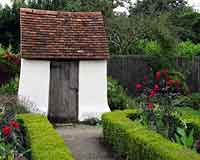|
||||||||||
|
Works: 'To the Rev. William Bull' by William Cowper (A poem about friendship - and smoking) The following poem was written by Cowper as a verse epistle to Bull, after his friend had left a box of tobacco behind on one of his regular visits to Orchard Side. Though the last couplet about Bull is often quoted, the complete poem is seldom printed in standard editions of Cowper - perhaps because it originated as a letter - but is worth reviving as an example of his skill in this kind of occasional verse. As well as a testament of friendship, it is an ode to the joys of tobacco - whether smoked or taken as snuff ('pulverized it gain/ A speedy passage to the brain'). Cowper was a snuff-taker. |
|
|||||||||
| The poem divides into two sections. In the first, Cowper laments the absence of inspiration for the poem he wishes to write for his friend: even though the sun is shining and its god, Apollo (also the god of poetry), should be helping the writer, he remains aloof. The poet looks for an alternative 'succedaneum' (a curious word meaning 'substitute', 'remedy' or 'drug', also used by Wordsworth in The Prelude, Bk II, line 219). There follow several lines of comic dog Latin ('Quod caput...') which roughly translated mean 'Oh for a quick remedy, which may liberate head, brain and skull from the heavy weight pressing upon them, and also from the disease of dullness'. Tobacco comes to the rescue, and proves more efficacious than hellebore: Anticyra was a town in ancient Greece famed for the growing of that plant, which was used in the production of a drug for the treatment of insanity. We may find this a poignant reference, in view of Cowper's own mental problems. The poem's second section begins by addressing the Nymph responsible for making tobacco grow and flourish in the New World. It praises her for the divine weed which 'Does thought more quicken and refine/ Than all the breath of all the Nine' (Muses) - and which might even bring a peaceful resolution to the American War of Independence raging at the time. A prayer is offered up that her worshippers ('votaries') may continue to increase, 'And fumigation never cease'. The last lines return full circle to the theme of friendship celebrated at the beginning, and leave us with a picture of Bull and Newton calmly enjoying their smokes, but never satiated - 'Always filling, never full.'
|
||||||||||
|
||||||||||

